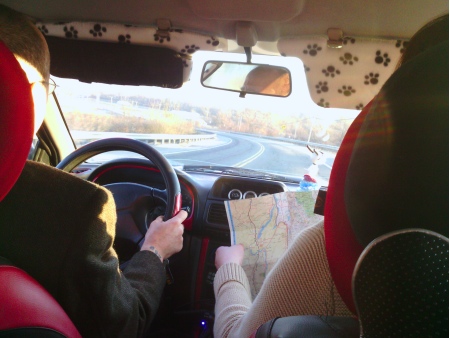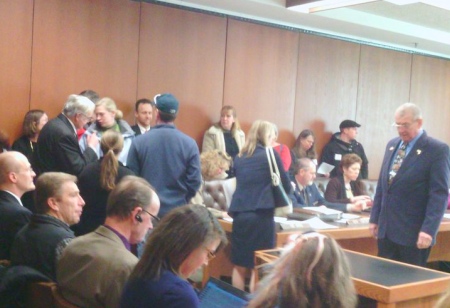On Tuesday, January 15, two VINE staffers, one VINE volunteer, and one friend of the sanctuary traveled to New Hampshire to attend the hearing on HB110. It was a sometimes surreal journey to a land where meat producers argue for animal protection legislation that animal advocates oppose. We call this report “On the Road to Concord” because Concord is the state capitol of New Hampshire and because “concord” is a synonym for agreement. We hope that, in offering our perspectives on the hearing and the proposed bill, we can help the citizens of New Hampshire reach concord about how best to deter and detect animal abuse and neglect.
HB110 is an “ag gag” bill disguised as an animal welfare protection provision. It requires anyone who photographs, films, or otherwise records animal abuse or neglect to turn the unedited photograph or recording in to the police within 24 hours. Sounds reasonable, right? It’s only on closer inspection that it becomes clear that this proposed law would not be helpful—and might even be hurtful—to animals.
“Ag Gag”—An Overview
In the wake of 9/11, lobbyists for corporate agribusiness capitalized on fears of terrorism to pass the federal Animal Enterprise Terrorism Act, which makes many common activist tactics into federal offenses carrying terrorism penalties if the target of the activism is a business that exploits animals. Both nonviolent civil disobedience and otherwise perfectly legal strategies, such as boycotts or picket lines on public sidewalks, become terrorist acts if they cause an animal enterprise to lose a substantial sum of money.
At the same time, at the state level, well-funded lobbyists began promoting legislation that would make it a terrorist act to take unauthorized films or photographs inside of an agricultural facility. The aim here was to intensify the penalties for activists who either go undercover as employees or trespass after hours to obtain evidence of animal abuse at such places. The quite obvious point of these laws was to silence–or “gag”–animal advocates.
Just as the AETA is now the subject of a federal lawsuit organized by the Center for Constitutional Rights, many of these state “ag gag” laws have met effective opposition from defenders of civil liberties affronted by such blatant attempts to suppress constitutionally protected free speech. The latest tactic is to rephrase laws intended to suppress animal advocacy to make them look like protection of animal welfare.
A close reading of the proposed New Hampshire law reveals that its structure places it into the “ag gag” category, whether or not this was what its sponsor intended. HB110 applies only to persons who have photographed or otherwise recorded animal abuse or neglect and applies only to farmed animals. A mandatory reporting law, by way of contrast, would require anyone witnessing abuse or neglect to report it and would apply to all animals.
So What?
So what if the purpose is to deter activists? Isn’t it good to require people to report animal abuse? How could this hurt animals?
First, anything that makes it more difficult to investigate and expose cruelty to animals is hurtful to them.
Next, and more urgently, animal abuse and neglect take many forms. A one-size-fits-all solution won’t work and could hurt. Sometimes, calling the police right away is the exact right thing to do. But at other times, calling the police is not helpful and might even be hurtful to the animal. Often, a witness to animal abuse or neglect is in a position to launch a more effective intervention than calling the police, such as offering material assistance in cases of neglect or using a personal relationship to persuade the perpetrator to surrender the animal. In contrast, sometimes animals die while authorities dither, hamstrung by regulations that prevent them from seizing animals they cannot prove are in immediate danger. Only in the most extreme cases are authorities able to immediately seize an animal. If authorities do not immediately seize the animal, but do let the perpetrator know that a complaint was made, the animal often ends up more isolated and endangered than before.
The guiding principle must be: What is in the best interests of this animal in this situation? By threatening well-meaning witnesses with a possible fine of up to a thousand dollars if they do not report within 24 hours, this law forces friends, neighbors, and family members to set aside their own knowledge of what might be most useful in a particular situation. The sister who sees that her sibling’s dogs are hungry must turn over the snapshots she took during her visit to the police, knowing that this means she probably won’t be welcome to stop by with dog food anymore.
This law also endangers witnesses by requiring them to report before they have taken self-protective measures and not allowing them to alter photographs to obscure features that would allow a possibly violent perpetrator to identify them. People are often rightly afraid of animal abusers, who may be their neighbors or family members. If actions like making an anonymous report to the local humane society may lead to prosecution for failing to contact the police instead, people will be less likely to report animal abuse at all.
Similarly, the farm employee who depends on the job to support his family ought to be afforded whistle-blower protection, rather than prosecution, if he sends photographs to a reporter at the local newspaper, exposing abuse or neglect that he dare not address directly with his boss. If employees know that they must report to the police—and may be prosecuted if they do not do so quickly enough—they are less likely to document any abuses they see.
This brings us to a final problem with the bill: its failure not only to protect whistle-blowers but also to preserve civil liberties. As it stands, the proposed bill violates the 1st, 4th, and 5th amendments of the U.S. Constitution, by inhibiting freedom of expression and freedom of the press; by subjecting witnesses to seizure of their private property; and by requiring witnesses who might have trespassed to collect evidence of animal abuse or neglect to incriminate themselves.
The Hearing
The hearing room was packed—standing room only!–with the preponderance of attendees opposing the bill. (By the end of the hearing, even a few people who had come to speak in the support of the bill were expressing some reservations.)
First up was the sponsor of the bill, who said that he was not lobbied by agribusiness and simply used a recent law passed by another state as a model in his quest to better protect both farmers and animals in New Hampshire. As would be the case for most of those who spoke in favor of the bill, he focused on the urgent importance of making sure that abused animals receive immediate aid but kept slipping into the subject of allegedly unjust accusations by camera-wielding activists who never report their findings to the police.
First up in opposition to the bill: The ASPCA. Now, since the ASPCA virtually invented animal protection legislation in the United States, one would think that their opposition to this bill would seal its fate as a credible animal protection measure. However, again as would be a pattern throughout the day, the ASPCA representative offered only vague answers when directly asked exactly how a requirement to report within 24 hours would be hurtful to animals. In yet another pattern, he was also questioned about his stance on animal rights.
So many more animal advocates testified that we cannot hope to list them all. One highlight, for us, was the early testimony of New Hampshire Animal Rights League representative (and VINE volunteer) Jennifer Wolf, who stood up well to hostile questioning from a cranky committee member. Another morning highlight was a concise overview of the civil liberties problems with the bill by a representative of the New Hampshire branch of the ACLU.
But one thing we could not help but notice was that some committee members who started out on the fence were getting restless and frustrated with what might have seemed to them like equivocation or even deliberate disingenuity by animal advocates who had all come well prepared, it seemed, to explain why this is an “ag gag” bill but not to explain exactly how it it would hurt animals. Often committee members asked for clarification but got only vague assertions or examples that weren’t quite on point. This may be because it’s nerve-wracking to testify and hard to think coherently when asked a question you didn’t expect. Everybody knows that terrible feeling of having your mind go blank when you’re on the spot. It’s also easy to forget to explain reasoning that seems self-evident to you but might not be so clear to those with less experience in your field. But meanwhile, proponents of the bill were portraying animal advocates as having a hidden agenda, and all of the indirect answers (not to mention refusals to answer by representatives of organizations not authorized to make comments beyond those in their written testimony) might have made it seem like maybe we really were hiding something.
Luckily, there were so many people lined up to testify that we ran into the lunch break, after which the committee had to attend to other business before reopening the hearing. This gave VINE’s representative the chance to revise her testimony, taking out the things that had already been well-covered and adding in some of those explanations and examples that committee members seemed to be asking for. Another speaker evidently had the same idea and offered concrete examples of how the bill might hinder prosecution of animal abusers or endanger animal rescuers. VINE’s representative also decided to directly address the allegations of hidden motives on both sides, thereby clearing the air and clearing the way (she hoped) for committee members who are sincere in their concern about animal abuse to figure out some way—other than this bill— to further protect animals in New Hampshire. VINE recommended that this bill be jettisoned and that members of the subcommittee formed to work on the bill meet with humane officers, prosecutors, and local animal welfare professionals with direct experience in rescuing abused animals in New Hampshire to find out what they think would help them to deter, detect, and prosecute animal abuse and neglect in the state. That, rather than some bill modeled on lobbyist-created legislation from some other state designed to solve some other problem, would be the most logical course for New Hampshire.
Action Alert (NH only)
The proposed HB110, which was proposed in the Environment and Agriculture Committee, has been sent to a subcommittee which will be meeting on Tuesday the 22nd. Until then, the chair of the Environment and Agriculture Committee will be accepting testimony on the bill by email. The chair of the committee is Representative Tara Sad, and the email address for the committee is HouseEnvironmentandAgricultureCommittee@leg.state.nh.us
If you are a New Hampshire resident, speak up! Draft a note to the committee, and send a copy to your own representative. Be polite and concise, clearly stating your reasons for opposing HB110. You don’t need to go on and on—the committee has been deluged by testimony, and committee members will appreciate brevity. A paragraph or two will do. Be sure to send a copy to your own representative. (If you don’t know who that is, look here to find out.)
Based on our experience at the hearing, during which we watched the committee members’ reactions to testimony very closely, we do not feel that it would be helpful for the committee to hear from persons or organizations outside of New Hampshire—with one exception: If you are a humane officer, veterinarian, shelter or sanctuary worker, or any other animal welfare professional who can tell a specific story about an instance when a report to authorities ended up being hurtful to witnesses or animals, please do share that information.
Here are some points you can make in your testimony. If, in making each point, you can include a real or hypothetical example, that would be very helpful. At the hearing, many of the representatives seemed to have a hard time imagining exactly how this law could hurt rather than help animals.
- HB110 endangers both witnesses and animals by forcing witnesses to expose themselves to retaliation and by forcing neighbors, friends, and family to call in authorities before they have done all that they could do to aid or rescue an endangered animal.
- In most instances, unless there is extensive documentation, the first report to authorities does not result in an animal being removed from the perpetrator’s care. Therefore, if a person is forced to make a report before gathering sufficient evidence, the subsequent police visit to the perpetrator may lead the perpetrator to retaliate against the animal once the authorities have left the premises.
- In many instances, the only person in a position to document abuse or neglect is also the only person able to see and help the animal. If they are forced to immediately contact the authorities, the perpetrator usually will know who made the report and usually will ban that person from the premises. Now, the only person who was looking out for the animal is no longer able do so. Whether that person was bringing fresh food and water or simply looking out for injuries, they will no longer be able to help or monitor the animal.
- In many instances, particularly in cases of neglect, neighbors or family members are able to convince the perpetrator to voluntarily surrender the animal to their care or to a sanctuary. If, instead of negotiating while caring for the animal, they are forced to call the police right away, then it will take a protracted court battle to remove the animal to safety, during which time the animal will continue to suffer and may die.
- In most instances, the witness will be in the best position to know whether now is the time to call the police or, in the alternative, take other steps. A caring neighbor who elects to feed and eventually rescue a neglected animal should not be made into a criminal because she did not call the police instead.
Please notice that there is nothing in the above list that mentions “ag gag” or the intent to suppress animal advocacy. The bill does not say that this is its intent, and its sponsor insists that this is not his intent. It would not be useful, in our view, to argue that this is repression in disguise, even if you do feel that’s what it is. Just tell the representatives who really do care about animal welfare exactly how this bill would have an effect opposite of its stated intent.
You may also wish to mention civil liberties. Civil liberties are important not only because they preserve our right to advocate for animals but also because people are animals—and that means that civil liberties are animal rights! However, we feel that the civil liberties case has been made adeptly by the ACLU and other lawyers. Animal advocates should concentrate on explaining why this bill is bad for animals. If you mention civil liberties, stay with freedom of expression (which includes freedom to take and publish pictures) and then bring that back to the animals who may be helped by long-term investigations that would be cut short by a requirement to surrender photographs to police within 24 hours.






